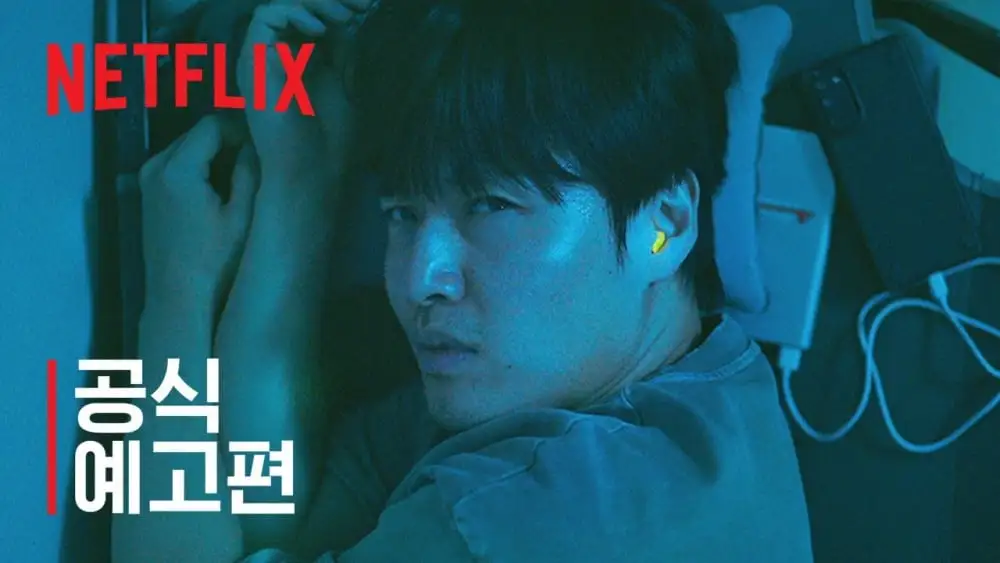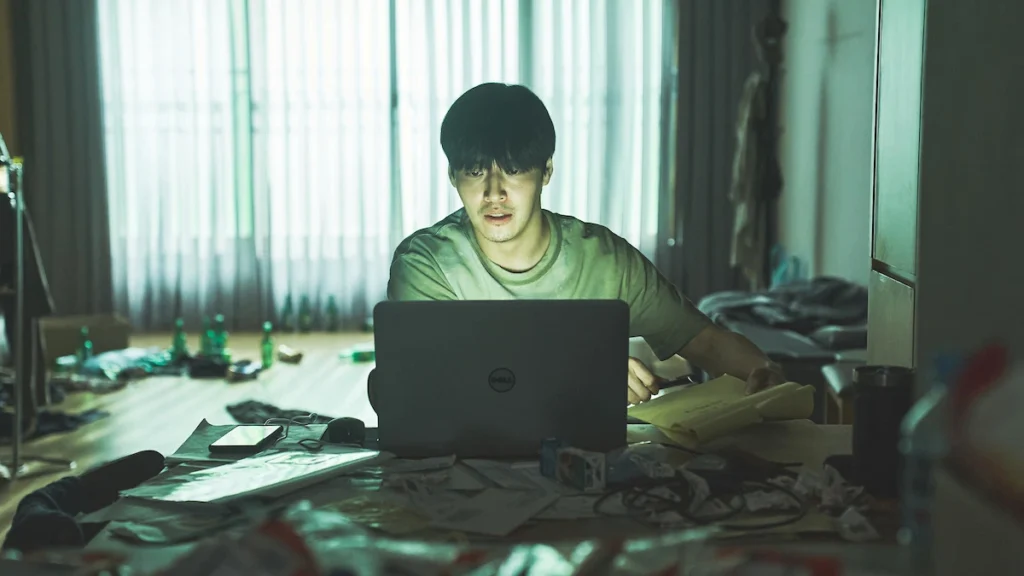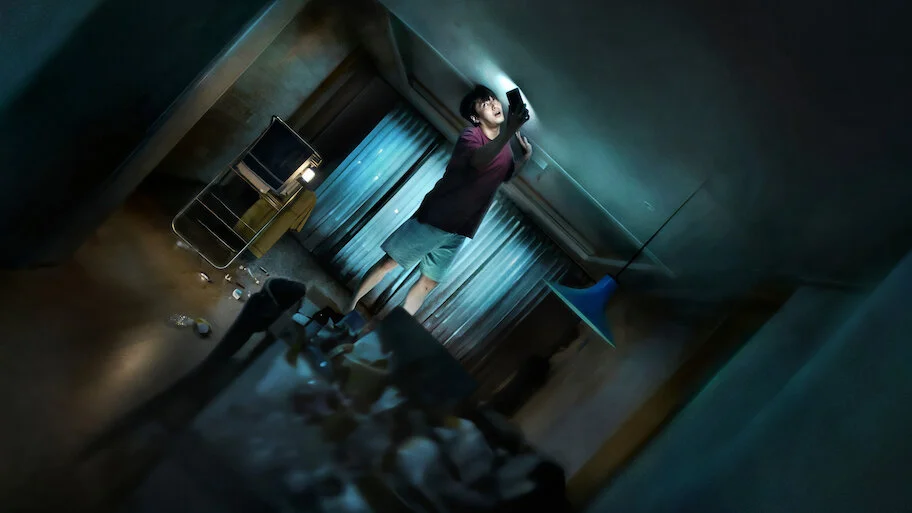Spoiler alert engaged. Netflix’s Korean thriller Wall to Wall (aka 84 square Meters) begins like a quiet domestic drama where there’s a man, a new apartment and a dream of peace. By the final act, it’s sharpened into a parable about class, corruption and the low, constant hum of fear that never fades.
The Wall to Wall ending doesn’t tie up the mystery, instead, it tends to lift the curtain on the system that actually created it, one designed to keep grinding long after the credits roll. At its heart is Noh Woo-sung, an everyday man chasing the fantasy of safety within the four perfect walls. But the walls don’t protect him; they answer back. The final scene is the cruel punchline and it lands with a bitter laugh, reminding us that in this world, comfort is fragile and the noise never really stops.
Let’s close the door and get inside the room and talk in depth about the ending of Wall to Wall.
The Racket Upstairs Wasn’t a Neighbor, It Was a Plan

Those relentless thuds aren’t random, they’re calculated. The man upstairs, Young Jin-ho is no cranky neighbor but a freelance journalist with a grudge that’s been aging like bad whiskey. Years ago, prosecutor Jeon Eun-hwa, who is now sipping wine in the penthouse, buried his investigation into crooked construction and kickbacks. Jin-ho’s revenge? Move in and make her downfall the loudest story in the building.
His weapon of choice was a hidden “revenge speaker” in Woo-sung’s walls, timed to unleash chaos at all hours. Every bang , every jolt, every sleepless night feeds the narrative, the one in which Woo-sung is no longer a homeowner, but the unraveling centrepiece of a scandal. By the ending of Wall to Wall, the pieces are perfectly placed: a native buyer, a corrupt powerbroker and a crusader willing to salt the earth for proof! The tragedy isn’t just that Woo-sung is framed, it’s that the frame really fits!
The Penthouse Showdown Lights the Fuse
Everything comes to a head in Eun-hwa’s glass fortress. Woo-sung, now painfully aware he’s been a pawn, storms into the final act. Jin-ho corners Eun-hwa, ledger in hand which is the master key to her corruption and all this while the room tips toward chaos. Words turn to blows and in the scramble, both Jin-ho and Eun-hwa fall. The Wall to Wall ending rejects any notion of victory; the so-called hero and villain exit together, leaving Woo-sung in the rubble with the one thing that everyone wants!
Jin-ho’s dying breath carries a plea: Take it. Expose her. But Woo-sung has spent the entire film as evidence in someone else’s case. The ending hands him the only move no one saw coming, his own choice. Whether he burns the ledger, hides it or uses it, the ledger is left hanging like the last echo in an empty apartment.
Why Woo-sung Burns the Proof

Two piles sit on the table: the ledger that could gut Eun-hwa’s empire and the paperwork proving he sold his apartment under duress. Woo-sung doesn’t hesitate and both go into the oven. Gas hisses, paper curls, flames bloom. He steps outside. The blast wipes out not just evidence, but the tidy narratives others would have spun from it.
This is the heart of Wall to Wall ending: survival over sainthood. It isn’t apathy, it’s self-preservation. Jin-ho wanted a martyr. Eun-hwa needed a scapegoat. Woo-sung refuses to be either. He chooses an invisible victory: to disappear from the story entirely, even if it means vanishing in a plume of smoke.
Also, read Heretic Ending Explained: Faith, Fear and One Seriously Twisted Garden
The Last Laugh (And Why It Stings)
Woo-sung survives. Months later, he’s back in Seoul, standing in a stripped-care apartment with no furniture, no baggage, just walls and the weight of silence. Then, somewhere in the building, a dull knock echoes. Not his wall this time. He stops. He laughs.
It’s not joy, it’s recognition. The Wall to Wall ending lets him hear the old noise and instead of unraveling, accept it for what it is, the hum of the city’s machinery. Debt, envy, property lines, rules bent for the powerful, fines for everyone else. The villains are gone, but the system hums on.
The laugh is the thesis. Today it’s a revenge speaker, tomorrow it’ll be something else. The city doesn’t really believe in closure, and neither does the world that built those walls.
What the Film is Really “Banging” About

In Wall to Wall, the sound design is more than atmosphere, it’s a conscience with a hammer. Every thud carries its own syntax: resentment over class lines as flimsy as drywall, the way petty annoyances can swell into sleepless dread, the polite inertia of institutions that nod, file a report and change nothing.
Viewed through that lens, the Wall to Wall ending clicks into place, the racket isn’t just upstairs. It’s built into the foundations: the market that prices you out, the courts that delay until you quit, the HOA memos that smile until you miss a fee. Woo-sung isn’t just hearing a neighbor. He’s hearing the city itself which is persistent, indifferent and impossible to shut off.
What the Ending is Really Saying?
System Outlast Villains: Jin-ho and Eun-hwa exit the stage, but the architecture they lived in with scarcity, debt, prestige housing, weaponized bureaucracy remains intact. Wall to Wall makes it clear that the noise is built into the structure and not just the neighbor upstairs.
Self-Preservation as Quiet Rebellion: Woo-sung’s choice to burn the ledger isn’t surrender but resistance. By refusing to be Jin-ho’s proof or Eun-hwa’s scapegoat, he reclaims the only thing the game can’t rig and that’s his own fate!
When the Crusader Becomes the Machinery: Jin-ho set out for sunlight, but engineered darkness to get it. His mission which was once righteous, ended up sounding like the very banging he planted, the loud, relentless and impossible one to live with.
The View from the Top doesn’t save you: Eun-hwa’s penthouse didn’t shield her. In Wall to Wall, altitude only adds distance to your fall, legal, moral and literal.
Also, read The Menu Ending Explained: Cheeseburgers, S’mores and a Savage Roast of the Elite
The Verdict: Wall to Wall Ending
Netflix’s Wall to Wall doesn’t hand you catharsis, it strips the tint off the glass. The villains go up in smoke, but the current that powered them, the status, debt, thin walls, thinner morals, they all keep buzzing. That’s why the ending stings, it’s less a cheer than a cold jolt, with Woo-sung holding his keys and letting out a laugh that’s learned too much to sound carefree. He’s not really laughing at the chaos but because he recognizes the punchline. The banging was never just a neighbor, it was the mortgage, the HOA letter, the kickback headline, the city life pounding from every direction.
The final beat flips the whole story. Silence was never part of the deal, at best, you buy yourself a spot to stand while the city taps on the pipes. That’s the sly genius of the Wall to Wall ending, it closes the file on the people, but leaves the case against the system wide open. You walk away uneasy, a little wiser and maybe ready to meet the next thud with steadier breath, because now you know what it really means!
Frequently Asked Questions (FAQs)
1. Was Jin-ho right to target Eun-hwa?
He had her number—she was part of the rot—but his methods soured the truth. By turning Woo-sung into bait, he proved the case and ruined himself in the same breath.
2. Is Woo-sung a coward for burning the ledger?
No. He’s a realist. The film makes it clear that institutions stall, twist, and blur until victims become punchlines. Woo-sung refuses to be the next headline.
3. Does the final bang mean the nightmare starts over?
Not exactly. It’s the city humming the same old tune. The Wall to Wall ending isn’t a reset button—it’s an admission that peace here is something you build in your own head, not in your walls.